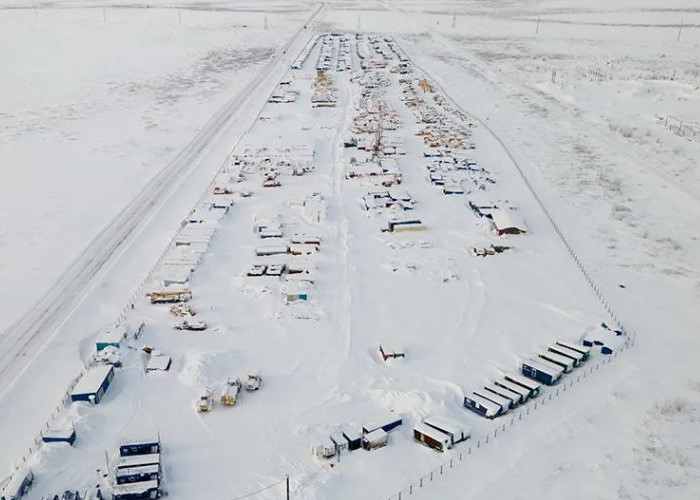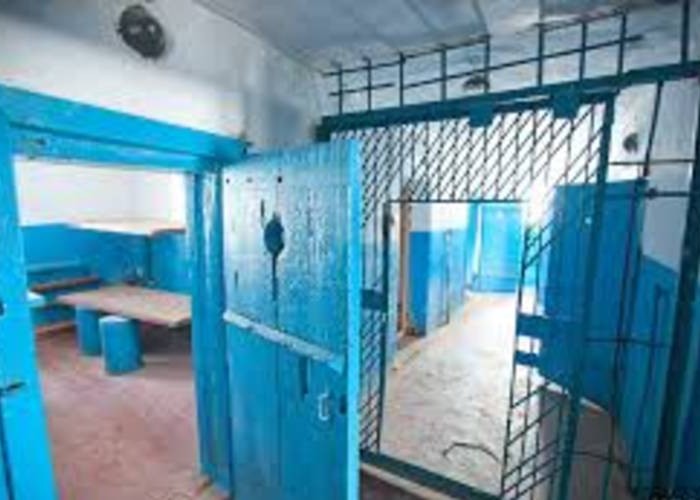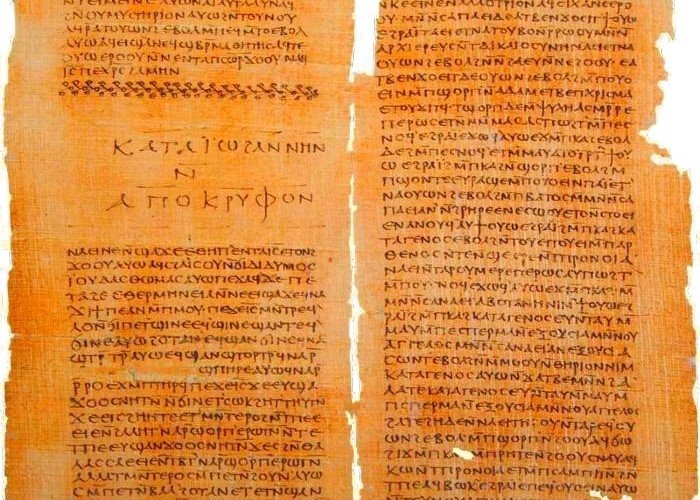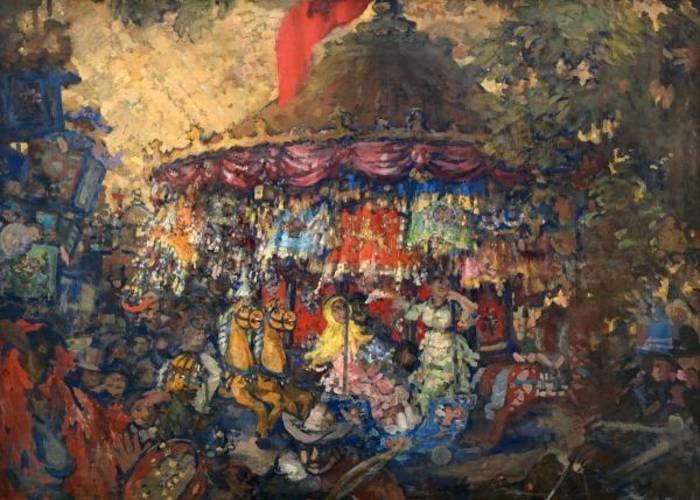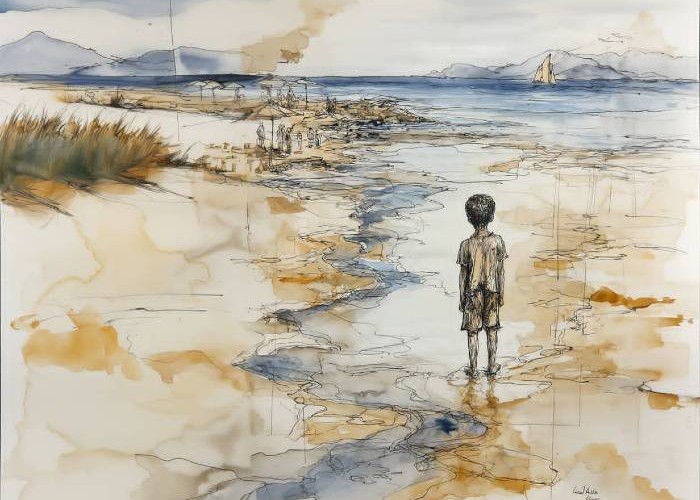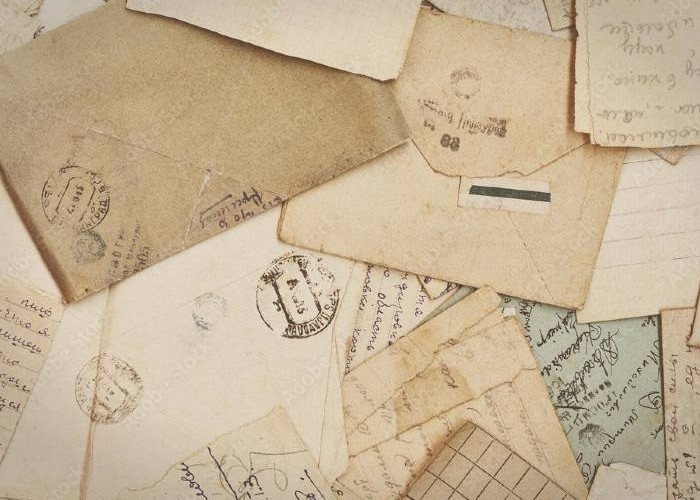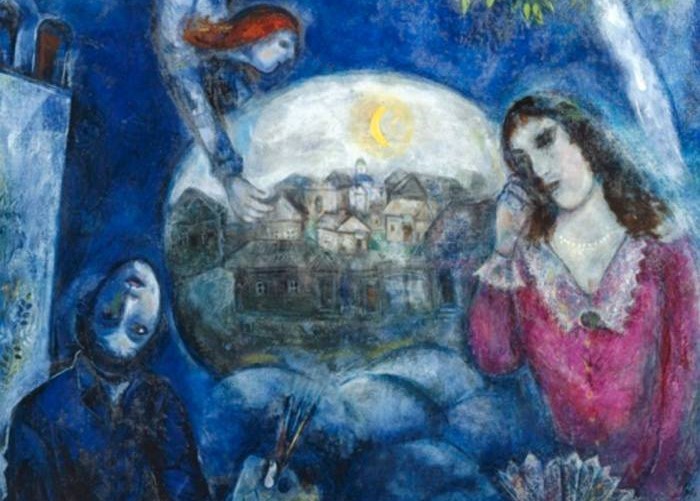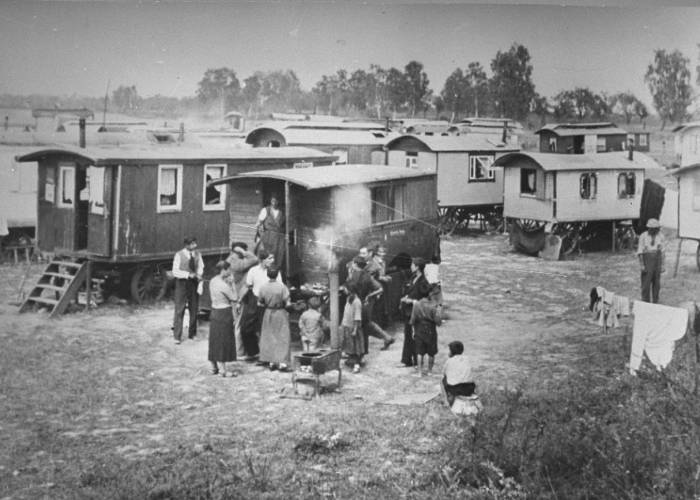A streak of light breaks through the tightly closed curtains. This means it’s already seven o’clock in the morning. The city rumbles outside the window, but in Frau Volkner’s room, the silence is interrupted only by the ticking of the clock on the bedside table. She used to love this morning time. “My Bertha is an early bird,” Otto used to say. She woke up early in the morning, and Otto did not linger in bed either. Here he was, getting up at dawn, white foam on his cheeks, looking at himself in the round mirror on a wall, confidently moving his razor up and down. A waffle towel hung over his shoulder. His brush was sunk in the soap basin which Bertha kept at the ready. Otto was broader and shorter than she was. His snow-white shirt was tucked into his breeches. Everything in Bertha’s house was white and shiny. She was such a lover of cleanliness. Even the Prussian eagle on the pointy helmet was shining, polished with tooth powder. Bertha forgot when the helmet had come into the house, didn’t Otto bring it from somewhere? Or maybe it was his own helmet, who knows? Yeah, well, he still had some kind of medal for something. “Trim your mustache a little, Otto, it gets wet when you drink beer out of a mug.” Otto would laugh, showing his smoker’s teeth. “I could use a coffee and a sandwich now, huh?”
Bertha wouldn’t mind having coffee herself, but she has to wait until nine in the morning for Fräulein Baum to fly into her room in a white robe and help her put on her stockings. Bertha struggles to get her leg out from under the covers. The leg is swollen. “You can’t go far on legs like that,” she sighs. She could have slept some more, but the memories that had come over her dispersed the sleep.
They used to have a lot to do in the morning. The milkman would bring in cans of milk before dawn, then the baker would arrive with fresh bread and rolls. Otto opened the shop at seven o’clock in the morning when people were leaving for work. There was no work in Marzahn, but there was cheap housing. The best way to get to Berlin was by bus. Bertha stood behind the counter in her starched apron, with a powdered nose and tinted eyebrows. She had never been a beauty. “You’ve grown a mile,” her father always grumbled when he had to lift the saddle on his bicycle for her, “you’ll soon be too small even for my shoes. That was true – her legs were long, her feet big, and she was tall, with large breasts and a wide pelvis. No one would call her bony, even in the hungry post-war years, and when she and Otto got married and started trading, she grew fat. It was no accident that he nicknamed her “Big Bertha”. One day he found a picture in a magazine of an enormous cannon from which the Germans were firing at the French. “See, her name was like yours!” It was the same picture he showed to his friends at the joint. “Look, Big Bertha has a muzzle as thick as my dick!” Who said that? I can’t remember. They had quite a laugh. They loved to laugh, drink beer, bang mugs on the table, and eat sausages and cabbage. And how they loved to listen to the accordion! Hans Linz played on Saturdays. Suddenly, Bertha has tears in her eyes. Where do they come from? When she was young, not a single tear could be squeezed out of her, and now she is remembering the accordionist’s name and crying. She tosses and turns in her pitifully creaking bed. She turns on the lamp on the nightstand. It’s still only twenty past eight. She turns off the lamp and stares into the darkness, pulling the blanket up to her chin.
They say Marzahn had always been a stinkhole, but she loved her village.
It matters where you were born, got married, and where all your family members died. That’s where it all was.
Now they built high-rises in Marzahn and even introduced street cars and buses. The sprawling Berlin has taken over the village and the surrounding meadows. Now they called it “the bedroom community.” Bertha blew her nose into a paper napkin. She listened. The noise of the city soothed her, transported her back in time to her childhood, when, upon waking, she counted the beats of the local church bell: one, two … seven. Or was it the bell of the monastery in Adlershof? There was that most welcoming Sister Beatrice. The smiling face of a nun with soft, puffy cheeks appeared before Bertha, and her hands were just as soft and puffy. One day she took Bertha to the convent cemetery where the sisters named Maria were buried: twenty-five small tombstones above each grave. On one sat a sparrow, or maybe some other bird. A flap — and off it flew! And why did that little bird remain in her memory? A pigeon had flown into their shop before Otto died. Maybe now it was her turn. Bertha turned on her other side and switched on the lamp again. There was something else in the Adlershof. Oh, yes! An airfield. That was where she had seen an airplane. Also a bird, only big and seemingly unreliable. To fly? No way. Thank you very much. She hadn’t thought of him for years, and here he was, in a green uniform with patch pockets. Willie something. Lieutenant Willie, with two cockades on his cap. Bertha herself was surprised at the clarity with which this detail came through. Well, yes, that’s because he brought water in his cap so that she could wash off the blood on her skirt. Where did he get the water there? I can’t remember now. There must have been a well somewhere nearby. This Willie was her first. Under the monastery wall, that’s where it happened. She didn’t resist much. You could say it was high time, but the right opportunity never came up. After the war, all men in Marzahn were snatched up. She never saw that lieutenant again. Probably he was killed afterward. They were all killed. Afterward. Although Otto didn’t qualify for another war. He smoked a lot, which was how he got asthma. And then the memory, which she had feared and always shook off as best she could, came back with desperate clarity: Otto at the bedroom door with a newspaper in his hands, his eyes bulging, whether with surprise or horror. He was going to tell her that the Führer had started the war with Poland, and saw her with her lover. Bertha grinned bitterly: you will remember such a thing!
That distant summer is also worth remembering. Some people in overalls showed up at the shop. They said they were leveling the field behind the village for some kind of reclamation. “What kind of reclamation?” – Otto was surprised, he even rode his bicycle there, but Bertha didn’t care about what was going on there, these people came to buy sausage and bread with the Reichsmarks, and she was not interested in anything else, and she was certainly not interested in the Olympics, about which the radio shouted all day. They did not go to Berlin often, and they were never drawn to the stadium.
Reclamation is reclamation, but the field was fenced with barbed wire, and policemen were stationed at the gates. One day trucks started to arrive and they unloaded people right on the field in the open air. Then came the caravans of wagons. Then all the curious people came out to see what was going on. And bonfires were burning, children with muddy skin running, horses neighing, and unfamiliar speech, and the smell of dung and sewage. The village stirred. Who are these people? Why are they here?
The mayor went to the police. And that’s when it all became clear: the Fuhrer’s orders.
Suddenly they all got quiet. If the Fuhrer ordered it, so be it. It could not be helped, we would live with the gypsies next door. Before that, Bertha had only seen gypsies in the circus. A wandering group passed through Martsan with monkeys and parrots, acrobats, and fortune-tellers. Well, so gypsies it is! They were allowed to buy food in the village, and they still paid in Reichsmarks. Loud women in colorful skirts and false gold teeth, their dark-skinned, bearded husbands, and small, beady-eyed children, all came into Bertha’s shop. From time to time, Otto handed out lollipops to the kiddies. Bertha and he didn’t have any of their own. Already then, she had noticed the elongated teenager, whose admiring eyes followed her. “How beautiful you are, Frau Volkner,” he whispered one day while she was wrapping him a pork sausage.
The memory of that compliment made Bertha smile. No one had ever called her beautiful. Her father grumpily called her “Tower,” and tipsy Otto jokingly patted her butt. “Mine walks like a horse!” — he boasted in the pub. In bed, he had to sniff her for a long time, and as soon as he was done, he immediately fell asleep. Naturally, now she wanted to get a better look at herself. What if she didn’t know that she was beautiful? “My God! Why? Why did I do that?” – The shame that had stagnated inside her over the years suddenly burned her face again.
Of all the Jews in Marzahn, she knew well only the shoemaker Goltz. It was a bright autumn day. The sun was reflected in the mirror that hung on the wall of his ransacked workshop. She could not resist. She went in and took it off the wall. “Look, Otto, what a frame!” He busily attached the mirror to their bathroom wall. Bertha shuddered at the memory. How could she rob a man who had already been robbed and humiliated? Now Otto was shaving in front of the big mirror. “Well, aren’t you glad your husband is so handsome?” — that was him talking about himself, rubbing his shaved cheeks with cologne, and not a word about her. Of course, she was no Marika Rökk, but she, too, was quite blond and curly in the latest fashion. “A real Aryan,” a woman who was buying some sweets from them told her, “you have a Nordic forehead and brow line. Bertha spends a few minutes trying to remember the woman’s last name. She can’t remember it. Whatever.
So what did that boy see in her? She recognized his name. Christian. Now when he walked into the store, her heart started pounding somewhere next to her throat. How long could this go on? Still, he was very young. And she? No kidding. She was almost thirty years older than him. Maybe if she and Otto had had children, none of this would have happened. No, she didn’t jump on the kid. It happened when he was eighteen years old. Bertha turned on the lamp again and put a second pillow under her head. So, it must have been in nineteen thirty-nine. Racial laws at that time were already known to all. Aryans were not allowed to mix with non-Aryans, but everyone in the village knew that the police guard of the camp openly used the services of Gypsies. If they could, why couldn’t she? As for Christian, he had grown into a real looker. Tall, precocious in stature, a little narrow in the shoulders, but with well-developed strong arms. She was aroused by the sight of his slender neck in the collar of his unbuttoned shirt, his black eyes gazing at her with challenge.
Staring at the ceiling, Bertha tries to remember if she had ever been this much in love before. No. Never. She’d brought him to the bedroom herself when Otto was God knows where. Their intermittent brief encounters recurred. Between meetings, she felt chills from remembering and waiting for the next one. “What’s the matter with you!” — Otto was perplexed when he saw her hesitatingly pouring sunflower oil for a customer, or suddenly freezing while leaning over a head of cheese. Bertha knew every bump on her lover’s body. In the semi-darkness of the bedroom, she liked to look at the whiteness of her body, shimmering beside his young, swarthy body. Back then she wasn’t at all embarrassed by the onset of aging. And that’s when Otto caught them. She no longer remembered what he had shouted, something like, “Don’t you understand that he’s only sleeping with you because of the sausage!” Or, “What were you wrapping him up quietly while I wasn’t looking? He’s just taking advantage of you, you old whore!” As for wrapping, it was true. Bertha wrapped everything he asked for. Maybe it was for his whole family. But she wasn’t sorry. No regrets at all! She remembered how Otto suddenly slumped and grabbed his chest. He wanted to shout something to her, something angry and desperate, but all that got out of him was an incoherent mumble. He died overnight. Otto Volkner, a veteran of World War I and a shopkeeper, was buried in the village. Now, remembering poor Otto, Bertha cried, but back then, she didn’t shed a single tear. Of course, it was hard, especially at first. I had to hire an assistant and things slowly got better. The main thing was that Christian kept coming to her.
Bertha looks at her watch again. It’s eight o’clock. She could, of course, get up, pull back the curtains, and rinse her face with cold water. Her whole life she had washed her face with cold water, but she had grown lazy in her old age. Pretty soon Fraulein Baum, that talking doll, will be here to do everything for Big Bertha. So… Christian. First, he asked her for money, and then he started taking it from the cash register himself. Of course, she didn’t like that. Ask for it, I’ll give it to you. Now she would have kicked such an impudent man to hell, but then she was insanely infatuated with him. Besides, she believed he was taking money for his sisters and his elderly mother. “Elderly,” Bertha grins. She was older than his mother. How could this all be? Maybe some gypsy woman had just put a spell on her. They can do that. Only her happiness soon waned. And it wasn’t even about Christian, it was about what began to happen in the camp behind the barbed wire.
Bertha sees a spider hanging from a long web. Deftly moving its crooked legs, the spider comes down on her pillow. She mechanically swats it with her palm and flicks it off the pillow. “What a disgusting thing! I hate spiders!” It’s a long time since anyone but spiders visited her. A cat that lived here used to visit, but then the cat was gone, too.
Yes, so … She used to have a lot of acquaintances, of course, the whole village shopped at her shop. One of them said that in the morning the gypsies would be taken away from the camp. “Where to? – she asked, frozen.” “Where-where? How do we know where.” She rushed toward the field, toward the barbed wire. But you couldn’t go through the gate, there were guards there. And you couldn’t run along it, there were ditches full of sewage.
She could hear the noise but could not see what was going on behind the wire. She stood there for a while and went home. She couldn’t sleep a wink that night. In the morning there was a knock on the window. My beloved boy has come running! No, no! I won’t let you go anywhere! I’ll hide you! I won’t give you away to anyone! And she hid you in the basement. Was it dangerous? It was very dangerous! Most of all, she was afraid of being denounced by the girl who worked for her in the store. But miracles do happen. The girl soon moved somewhere, probably to Berlin, without learning their secret.
After a couple of weeks, Bertha went to the camp to find out what was going on. The field was deserted, but there were lights in some of the barracks’ windows, which meant that someone was still there. How did she get the guard to talk? For some reason, Bertha wants to remember what she gave the longhaired SS man. A pack of cigarettes, probably. He was polite and even friendly. Maybe he was just bored with doing nothing at the gate. “What does it matter now?” – Bertha wonders at the tenacity of her memory trying to recall the details of their conversation. Briefly, he said that the Gypsies had been taken to work at Auschwitz. At the time, she did not know what that place was. Could she have imagined what they did to people there? And no one could. Christian, on the other hand, looked totally changed when he heard about Auschwitz. The gypsy radio must have spread the news around that no one was coming back from there. He escaped at night. What was she to do? Nothing. She didn’t show her face. She worked in her shop. But there was less and less work: the shelves were almost empty. And then he came back, and not alone. That’s my fiancée, Katharina, he said. Hide her, too. Well, Katarina, it is then, Katarina it is. You can’t throw her out on the street. How many years had passed and Bertha still remembered how her heart clenched. So Otto was right. On the other hand, could she have had any future with that gypsy boy? He must have loved Katarina. Well, Katarina, not Big Bertha, was from his people. And she was not particularly beautiful: small, black-eyed, thin, and very young.
Bertha looks at her watch again. It’s half past nine. Soon it’s time to get up, to start a new day of her old life… That’s how they lived in her basement for a year. The streets of Marzahn were deserted: some had moved to Berlin, others, on the contrary, had hidden away in villages, closer to their vegetable gardens. Bertha used to buy cereals and potatoes. That was what she fed her gypsies as well. They could not go outside. All the Jews and Gypsies had long since been deported, and she was afraid to ask where they had been taken. And why did she need to know? People said nothing. From the bathroom mirror an aging woman with faded eyes and wrinkles around her eyes, grown old with perpetual fear, watched her. She wasn’t even jealous anymore. That, too, took strength. One day, somewhere in the year forty-three, the little fool disappeared. She couldn’t stand being locked up, you see. She wanted to know what was going on in their gypsy camp. Some from her tribe might have still been there. So she disappeared, she never came back, and Christian disappeared, too. He went looking for her, even though Bertha asked him to stay in the basement and keep his head down.
Now tears crawl down her cheeks again. Yet then she even breathed a sigh of relief. It was a strange feeling: sorry for them and happy for herself. She’d known she’d be next if someone told on her, and she hadn’t wanted to die then. Even now she doesn’t want to. Nothing she can do about it. And so she lived to the age of ninety-two, for better or for worse. Now it’s time. She’s the only really old one left in this place among all the old people. So the gypsy wasn’t lying when she predicted her long life. It was in the last war spring. The green grass had just sprouted in the gypsy field. Why had Bertha gone there? Maybe she hoped for something, maybe her feet led her there. In the village, they said they had seen some Gypsies there. There were no guards anymore, only barbed wire, and it was all torn up. The gypsy approached her herself. I know you, she said. You’re Big Bertha. You hid my granddaughter in the basement. What’s the matter with Bertha today? Why can’t she stop crying this morning?
Because the gypsy told her: “All the Sinti were killed, all the Romanis were killed. Don’t wait, no one’s coming back here, and you, I can see you’re going to live a long life.”
What else is there left to remember? From the bombings and the months of starvation, her memory retained almost nothing. Then the victors came. They searched the basement, the empty shelves in the store. It was good that by that time she already had nothing. One of them even took pity on Bertha, who was wearing an old dress like a rag and gave her a can of stew and breadcrumbs. But another took off the mirror in the bathroom, the same one. He must have liked the patterned frame, too. Yet Bertha didn’t feel sorry, she hadn’t had any desire to look at herself for a long time. She began to come alive little by little together with Marzahn, and then Berlin moved here, swallowing up the old streets with shabby houses. In West Berlin, Bertha had no one, she had no one anywhere, so she ended up in an almshouse overlooking the former “gypsy field.”
Fraülein Baum flew into the room with a chirp. Isn’t this bird from Nun Maria’s grave? She pulls open the curtains, turns off the lamp, and stands in front of her with her stockings at the ready: she is about to pull them over Bertha’s swollen legs. What is she babbling on about? Bertha tries to listen. Oh, yes! Honecker has resigned! Who’s Honecker? Oh, my God! Bertha can’t remember — in her life she’s seen so many of them come and go. She struggles to sit up in bed, extending her legs out from under the covers. “Ahahahah!” – is all she says. – She was Big Bertha and now she’s Old Bertha!


